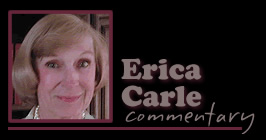Other Carle Articles:
Government
Religion In The
United States
The
Chamber Of Commerce:
It's Power And Goals
Control The Environment To Control Humanity
Universal Brotherhood And The Drive For World Unity
HAVE YOU OVERLOOKED THE OBVIOUS?
Erica
Carle
August 27, 2005
NewsWithViews.com
Never, since before the earliest days of independence, have the United States been without Chamber of Commerce pressure on government. For better or worse the Chamber of Commerce has been used to convince or intimidate senators, representatives and state legislators to support its goals and enact legislation it promoted .
The first Chamber of Commerce, that of New York, was organized in 1768 and incorporated by royal charter in 1770. Others were established about 1775 at New Haven, Conn and Charleston, S. C . The Philadelphia Chamber of Commerce was established in 1802. On the 13th of April, 1784 the New York legislature passed an act concerning the corporation of the Chamber of Commerce and confirming the rights and privileges thereof. Its title then became the Chamber of Commerce of the State of New York.
The merchants and ship owners who founded the New York Chamber of Commerce stated its usefulness as follows: �Whereas, Mercantile societies have been found very useful in trading cities for promoting and encouraging commerce, supporting industry, adjusting disputes relative to trade and navigation, and procuring such laws and regulations as may be found necessary for the benefit of trades in general. . .�
Membership has usually been confined to citizens engaged in finance and commerce. However records have shown that presidents, governors, senators, congressmen, foreign ministers, and members of the state legislatures have been honorary or regular members.
In an article published in One Hundred Years of American Commerce Alexander E. Orr, president of the New York Chamber in 1895, wrote: �The Chamber of Commerce of the State of New York was not only the forerunner of many similar institutions in other states, but also broadly national in its sympathies and work. . . No great politico-economic question has arisen in the United States from the War of 1812-15 to the present time (Note: 1895) in which it has not been vitally and patriotically interested. It has been concerned in nearly everything which related to the commercial welfare and prosperity not only of the city and State of New York, but also of the country at large, of which it is in a measure the commercial guardian. . .�
He continued:
�Next to the New York Chamber of Commerce is the Associated Board of Trade
of Boston. This is probably the best representative body among strictly
business associations in this country. Founded on a new idea or plan,
it has so demonstrated, during the few years of its existence, its great
practicability and usefulness as to become the exemplar of the newer Boards
of Trade throughout the country. . . The Boston Associated Board of Trade
is not a promiscuous grouping of business men coming together as individuals,
but is made up of delegates from various regularly organized trade associations
of that city, these representatives being duly elected by their own organizations,
and attending the Associated Board of Trade meetings, to speak and act
not only for themselves, but as voicing the wishes of the associations
which send them. Thus, when the members of the Associated Board of Trade
make a decision, their action is at once of importance in forming commercial
and legislative opinion.
�As New York is the commercial metropolis of the United States, her merchants, of necessity, must be equally comprehensive in their dealings not only in home products, but also in those of all other countries with whom they hold commercial relations...�
Take special note of the following claim made in the final paragraph of Mr. Orr�s article:
�Thus it will be seen that, starting with but four commercial organizations, of the character and scope outlined, at the beginning of the nineteenth century, their number at its close will have increased five hundred fold. What they have accomplished for the people of this country is simply incalculable. The record is found in our extensive manufacturing industries; in the products of the soil, forests, and mines; in our enormous interstate commerce; in our foreign trade; in our circulating medium and monetary institutions; and, finally, in the unprecedented increase in national wealth, prosperity, and development. �
Orr gave credit for the manufacturing, farming, mining, commerce, foreign trade, banking, and the resulting prosperity not to the manufacturers, farmers, miners, traders, bankers, and American workers, but to commercial organizations numbering 2000 by the close of the nineteenth century.
In the twentieth century Chambers of Commerce size, number, and legislative activity continued and increased. One significant �accomplishment� which the Chambers of Commerce boasted was the creation of the Federal Reserve system in 1913.
The International Chamber of Commerce, created in 1919 in Atlanta and headquartered in Paris, France, immediately placed itself in the center of all international negotiations. It supported the League of Nations and later, the creation of the United Nations. It was then able to influence United Nations policies through the Economic and Social Council (ECOSOC) and the UN Educational, Scientific and Cultural Organization (UNESCO).
The International Chamber of Commerce urged the United States and other nations to support what it called �economic disarmament.� It was also the belief of policy makers for the Chamber that commerce would be benefitted and world peace would result if the governments of all countries would consent to being supervised and regulated by a world government. Throughout the twentieth century the International Chamber of Commerce has worked for this goal.
Chambers of Commerce in the U. S. have supported revenue sharing--much of it shared with Chambers of Commerce, regional government, school busing for integration, Transcendental Meditation, government medical care, HMOs, foreign aid, technology transfer to other countries, the Earth Charter to replace Christianity, the Gorbachev Foundation, sustainable development and smart growth, the World Economic Forum, Business Action for Sustainable Development (BASD), State of the World Forum, elimination of trade and travel barriers between nations, the Central American Free Trade Agreement (CAFTA), land use planning, world government, etc. etc. etc.
If you are opposed to any Chamber-promoted program without acknowledging the powerful and variously-connected Chambers of Commerce as your adversaries, the best I can say for your chance of success is, -- Good Luck -- but you are totally outmatched by your unrecognized opposition and its connections. If you intend to succeed, do not overlook the obvious. The Chamber of Commerce with its many connections is your chief adversary.
References:
1,
Alexander E. Orr, President New York Chamber of Commerce; One Hundred
Years of American Commerce; Edited by Chauncy M. Depew, LL.D.; D. O.;
Chapter IX �Commercial Organizations�; Haynes & Co. 1895; p. 50.
2, Merchants
of Peace -- The History of the International Chamber of Commerce by George
L. Ridgeway, Little Brown & Co.,, 1938, 1959.
3, WASHINGTON
REPORT--Weekly newsletter published by the Chamber of Commerce of the
United States. Issues from 1968-79.
4, THINK
-- IBM in-house publication. Issues from 1937-1970.
5, The
United Nations Yearbook, 1979.
6, Plus
internet sources.
� 2005 Erica Carle - All Rights Reserved
Erica Carle is an independent researcher and writer. She has a B.S. degree from the University of Wisconsin. She has been involved in radio and television writing and production, and has also taught math and composition at the private school her children attended in Brookfield, Wisconsin. For ten years she wrote a weekly column, "Truth In Education" for WISCONSIN REPORT, and served as Education Editor for that publication.
Her books are GIVE US THE YOUNG--$5 Plus $2.00 P&H WHY THINGS ARE THE WAY THEY ARE--$16 PLUS $4.00 P&H BOTH BOOKS -- $25 Total. A loose leaf collection of quotes titled, SIX GENERATIONS TO SERFDOM is also available--$15 Plus $2.00 P&H. Mailing address: Erica Carle; PO Box 261; Elm Grove, WI 53122.
E-mail: ericacarle@sbcglobal.net
The International Chamber of Commerce urged the United States and other nations to support what it called �economic disarmament.�











